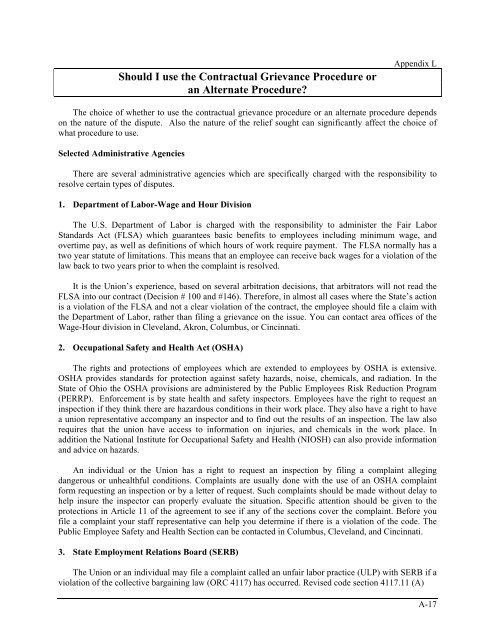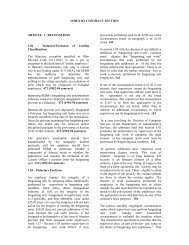Download the Grievance Guide - OCSEA
Download the Grievance Guide - OCSEA
Download the Grievance Guide - OCSEA
You also want an ePaper? Increase the reach of your titles
YUMPU automatically turns print PDFs into web optimized ePapers that Google loves.
Should I use <strong>the</strong> Contractual <strong>Grievance</strong> Procedure or<br />
an Alternate Procedure?<br />
Appendix L<br />
The choice of whe<strong>the</strong>r to use <strong>the</strong> contractual grievance procedure or an alternate procedure depends<br />
on <strong>the</strong> nature of <strong>the</strong> dispute. Also <strong>the</strong> nature of <strong>the</strong> relief sought can significantly affect <strong>the</strong> choice of<br />
what procedure to use.<br />
Selected Administrative Agencies<br />
There are several administrative agencies which are specifically charged with <strong>the</strong> responsibility to<br />
resolve certain types of disputes.<br />
1. Department of Labor-Wage and Hour Division<br />
The U.S. Department of Labor is charged with <strong>the</strong> responsibility to administer <strong>the</strong> Fair Labor<br />
Standards Act (FLSA) which guarantees basic benefits to employees including minimum wage, and<br />
overtime pay, as well as definitions of which hours of work require payment. The FLSA normally has a<br />
two year statute of limitations. This means that an employee can receive back wages for a violation of <strong>the</strong><br />
law back to two years prior to when <strong>the</strong> complaint is resolved.<br />
It is <strong>the</strong> Union’s experience, based on several arbitration decisions, that arbitrators will not read <strong>the</strong><br />
FLSA into our contract (Decision # 100 and #146). Therefore, in almost all cases where <strong>the</strong> State’s action<br />
is a violation of <strong>the</strong> FLSA and not a clear violation of <strong>the</strong> contract, <strong>the</strong> employee should file a claim with<br />
<strong>the</strong> Department of Labor, ra<strong>the</strong>r than filing a grievance on <strong>the</strong> issue. You can contact area offices of <strong>the</strong><br />
Wage-Hour division in Cleveland, Akron, Columbus, or Cincinnati.<br />
2. Occupational Safety and Health Act (OSHA)<br />
The rights and protections of employees which are extended to employees by OSHA is extensive.<br />
OSHA provides standards for protection against safety hazards, noise, chemicals, and radiation. In <strong>the</strong><br />
State of Ohio <strong>the</strong> OSHA provisions are administered by <strong>the</strong> Public Employees Risk Reduction Program<br />
(PERRP). Enforcement is by state health and safety inspectors. Employees have <strong>the</strong> right to request an<br />
inspection if <strong>the</strong>y think <strong>the</strong>re are hazardous conditions in <strong>the</strong>ir work place. They also have a right to have<br />
a union representative accompany an inspector and to find out <strong>the</strong> results of an inspection. The law also<br />
requires that <strong>the</strong> union have access to information on injuries, and chemicals in <strong>the</strong> work place. In<br />
addition <strong>the</strong> National Institute for Occupational Safety and Health (NIOSH) can also provide information<br />
and advice on hazards.<br />
An individual or <strong>the</strong> Union has a right to request an inspection by filing a complaint alleging<br />
dangerous or unhealthful conditions. Complaints are usually done with <strong>the</strong> use of an OSHA complaint<br />
form requesting an inspection or by a letter of request. Such complaints should be made without delay to<br />
help insure <strong>the</strong> inspector can properly evaluate <strong>the</strong> situation. Specific attention should be given to <strong>the</strong><br />
protections in Article 11 of <strong>the</strong> agreement to see if any of <strong>the</strong> sections cover <strong>the</strong> complaint. Before you<br />
file a complaint your staff representative can help you determine if <strong>the</strong>re is a violation of <strong>the</strong> code. The<br />
Public Employee Safety and Health Section can be contacted in Columbus, Cleveland, and Cincinnati.<br />
3. State Employment Relations Board (SERB)<br />
The Union or an individual may file a complaint called an unfair labor practice (ULP) with SERB if a<br />
violation of <strong>the</strong> collective bargaining law (ORC 4117) has occurred. Revised code section 4117.11 (A)<br />
A-17

















